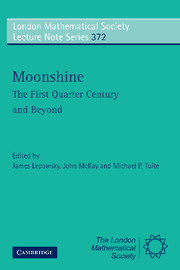 Moonshine - The First Quarter Century and Beyond
Moonshine - The First Quarter Century and Beyond Book contents
- Frontmatter
- Contents
- Preface
- Schedule of Talks
- Characters of Crossed Modules and Premodular Categories
- On the Injectivity of the Kudla-Millson Lift and Surjectivity of the Borcherds Lift
- Ordered Spanning Sets for Vertex Operator Algebras and their Modules
- Friendly Giant Meets Pointlike Instantons? On a New Conjecture by John McKay
- Modularity of Trace Functions in Orbifold Theory for ℤ-Graded Vertex Operator Superalgebras
- Twisted Modules for Vertex Operator Algebras
- Vertex Operators and Sporadic Groups
- The Algebraic Meaning of Being a Hauptmodul
- Borcherds' Proof of the Conway-Norton Conjecture
- On the Connection of Certain Lie Algebras with Vertex Algebras
- Vertex Operators and Arithmetic: How a Single Photon Illuminates Number Theory
- Rational Vertex Operator Algebras and their Orbifolds
- Quasi-finite Algebras Graded by Hamiltonian and Vertex Operator Algebras
- On Certain Automorphic Forms Associated to Rational Vertex Operator Algebras
- Moonshine and Group Cohomology
- Monstrous and Generalized Moonshine and Permutation Orbifolds
- New computations in the Monster
New computations in the Monster
Published online by Cambridge University Press: 06 July 2010
- Frontmatter
- Contents
- Preface
- Schedule of Talks
- Characters of Crossed Modules and Premodular Categories
- On the Injectivity of the Kudla-Millson Lift and Surjectivity of the Borcherds Lift
- Ordered Spanning Sets for Vertex Operator Algebras and their Modules
- Friendly Giant Meets Pointlike Instantons? On a New Conjecture by John McKay
- Modularity of Trace Functions in Orbifold Theory for ℤ-Graded Vertex Operator Superalgebras
- Twisted Modules for Vertex Operator Algebras
- Vertex Operators and Sporadic Groups
- The Algebraic Meaning of Being a Hauptmodul
- Borcherds' Proof of the Conway-Norton Conjecture
- On the Connection of Certain Lie Algebras with Vertex Algebras
- Vertex Operators and Arithmetic: How a Single Photon Illuminates Number Theory
- Rational Vertex Operator Algebras and their Orbifolds
- Quasi-finite Algebras Graded by Hamiltonian and Vertex Operator Algebras
- On Certain Automorphic Forms Associated to Rational Vertex Operator Algebras
- Moonshine and Group Cohomology
- Monstrous and Generalized Moonshine and Permutation Orbifolds
- New computations in the Monster
Summary
Abstract
We survey recent computational results concerning the Monster sporadic simple group. The main results are: progress towards a complete classification of the maximal subgroups, including showing that L2(27) is not a subgroup; showing that the 196882-dimensional module over GF(2) supports a quadratic form; a complete set of explicit conjugacy class representatives; small representations of most of the maximal subgroups; and a partial classification of the ‘nets’ (in the sense of Norton).
Introduction
Our aim in this paper is to update the survey by describing the various explicit computations which have been performed in the Monster group, and the new information about the Monster which has resulted from these calculations. We begin by summarising for the benefit of readers who do not have that paper to hand.
The smallest matrix representations of the Monster have dimension 196882 in characteristics 2 and 3, and dimension 196883 in all other characteristics. Three of these representations (over the fields of orders 2, 3, and 7) are now available explicitly. It is hoped that the data and programs to manipulate them will be made available in the next release of Magma. The generating matrices are stored in a compact way, and never written out in full. The basic operation of the system is to calculate the action of a generator on a vector of the underlying module.
Our first construction was carried out over the field GF(2) of two elements in the interests of speed, and proceeded by amalgamating various 3-local subgroups.
- Type
- Chapter
- Information
- Moonshine - The First Quarter Century and BeyondProceedings of a Workshop on the Moonshine Conjectures and Vertex Algebras, pp. 393 - 403Publisher: Cambridge University PressPrint publication year: 2010
- 1
- Cited by
